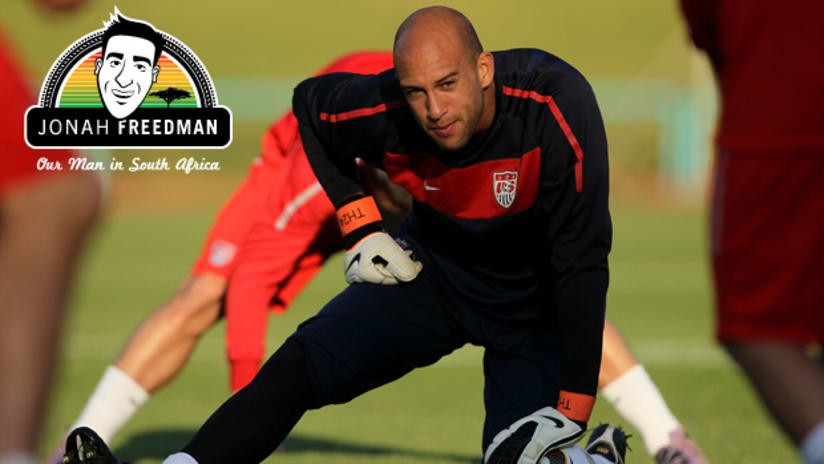JOHANNESBURG — We’re just days away from one of those watershed moments for US Soccer.
It’s not just that it’s the US’ participation in a sixth straight World Cup, but one of those rare times that a good portion of America—and we’re talking diehards and haters alike—are highly aware of the titanic matchup ahead:
USA vs. England, Saturday in South Africa.
“I don’t know what’s going to be better,” goalkeeper Tim Howard told reporters Thursday, “at the bar with my friends back home watching or actually playing it because it’s going to be special. I think our country’s going to stop”
It’s hard to avoid it—whether you’re an ESPN watcher, a Time magazine reader, hell, even just a commuter who notices billboards or ads on bus stops. An incredible amount of hype has gone into this game from the moment the balls were drawn at last December’s draw.
“It’s an unprecedented moment,” said US Soccer Federation president Sunil Gulati on Wednesday, “partly because of who we’re playing, partly because of where the game is in the United States, frankly partly because of the promotion on television in Spanish and English.
“There’ll be a lot of people watching this game on Saturday and it’s one of those opportunities we don’t get very often.”
Gulati didn’t mince words: All things considered, this may be the biggest game the US has ever played. Even with no David Beckham, nontraditional soccer fans Stateside will be watching to see how the US perform against an opponent they know is one of the world’s toughest.
“For the last six months, all we’ve seen is US-England,” Landon Donovan told reporters Wednesday. “So if you’re a casual sports fan at home, you might think this was the World Cup final. You wouldn’t know any different.”
And yet here’s the cruelest twist of all: The US are prepared to take a loss in this game. They’re keenly aware of the magnitude of the match, yet just as aware that, in the end, the result may not matter.
“In the bigger picture, it’s just one of the three games,” said Donovan. “And we understand that, and they’re all equally important.”
It will likely require six points to advance to the second round—that, more than making a huge statement against the heavyweight of the group—is the US’ goal. The Americans believe their second two opponents, Slovenia and Algeria, are beatable. A result against England, while nice, would just be gravy.
US head coach Bob Bradley has repeatedly stressed that the result of the opener shouldn’t matter much to his players: A win shouldn’t get them too up and a loss shouldn’t get them too down. It takes the combined results of those to advance.
Sure, it’s probably partly mind games to psyche his players out and demystify the powerful England team. But he’s also 100 percent correct: The US could lose this game and still could—and should—advance.
Still, a loss to England will leave the US needing points in their final two games, and their second game, against plucky Slovenia, could be the deciding factor of their survival. That may not be a comfortable position for Bradley to be in.
But as the US showed in last summer’s Confederations Cup, even if you start a tournament poorly, finishing the group stage strong can do an awful lot for momentum.
Let’s throw the unsavory side effect out there: What happens if an unprecedented TV audience back home sees the US lay an egg in their highest-profile game perhaps ever? Will that ruin some of the goodwill of this World Cup? It’s entirely possible. Fewer people may turn out to watch the Slovenia game, though it may be more important.
But probably the more important question becomes this: Would you rather play poorly against a world-class opponent, then rebound against your lesser foes and reach the knockout stages? Or devote all your energy to making a splash in front of an unprecedented audience back home, leaving little in the tank for your last two games and staring at an early ride home?
“It’s hard for me as a competitor as an athlete that sees the big picture to let my mind go there,” said Donovan of the idea of beating England. “I understand how much is put it into this game and I understand what it means. But there’s more to it and we have to be ready to react no matter what happens on Saturday.”
Follow MLSsoccer.com managing editor Jonah Freedman as he reports from South Africa during the World Cup. “The Throw-In” appears every Thursday.


